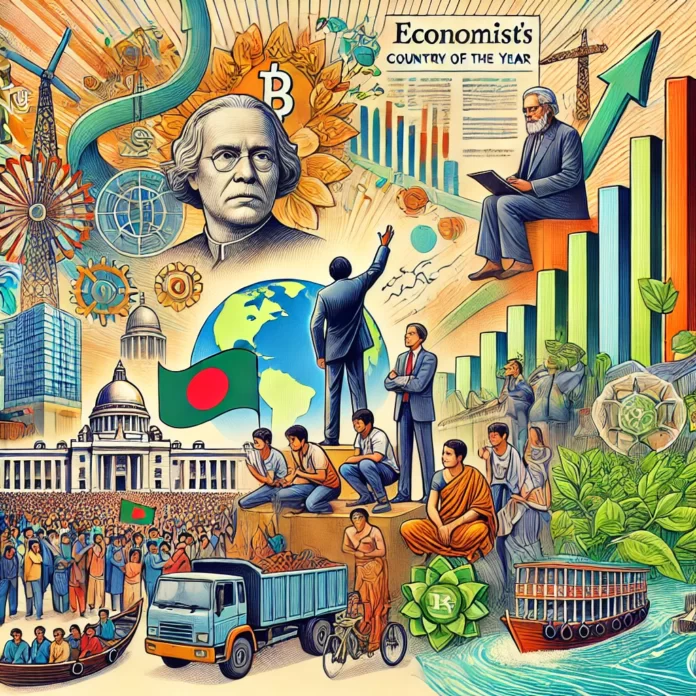Bangladesh has been declared The Economist’s “Country of the Year” for 2024, an annual accolade given to nations that show remarkable progress within a year. The recognition highlights Bangladesh’s student-led protests in August that ended the 15-year authoritarian rule of Sheikh Hasina, ushering in a temporary technocratic government led by Nobel laureate Muhammad Yunus.
Sheikh Hasina’s tenure, once lauded for rapid economic growth, was increasingly characterized by election rigging, suppression of dissent, and systemic corruption. Her removal marked a turning point in Bangladesh’s political history.
The interim government, backed by students, the military, business leaders, and civil society, has restored order, stabilized the economy, and initiated reforms aimed at fostering a more liberal and democratic governance system. Major tasks ahead include repairing strained ties with India, ensuring judicial neutrality, and paving the way for free and fair elections in 2025.
Bangladesh emerged as the winner from a robust shortlist of 5 countries that made notable strides in governance and reform. The other countries on the shortlist were South Africa, Poland, Argentina, and Syria.
South Africa, where the African National Congress (ANC) lost its parliamentary majority for the first time since the end of apartheid in 1994. A coalition government with the Democratic Alliance offers hope for better governance, though challenges like unemployment and crime persist.
Poland, where Donald Tusk’s new administration began reversing damage caused by the populist Law and Justice Party, which had eroded democratic institutions over its eight-year rule. Tusk’s government also strengthened Poland’s role in European security, although relations with Germany remain strained.
Argentina, where “anarcho-capitalist” President Javier Milei implemented radical free-market reforms, including slashing public spending and deregulation. While inflation and borrowing costs have fallen, the sustainability of these reforms remains uncertain.
Syria, which witnessed the dramatic ousting of Bashar al-Assad on December 8, ending a half-century of brutal dictatorship. The new reality, however, is fraught with uncertainty as Hayat Tahrir al-Sham (HTS), a rebel group with a repressive history, wields significant influence.
Bangladesh’s progress stands out due to its history of violent political transitions and entrenched political corruption. Despite these risks, the current technocratic government has stabilized the nation and garnered support across multiple sectors.
However, challenges loom large, including the potential resurgence of political vendettas, the threat of Islamic extremism, and the need to rebuild democratic institutions to ensure a smooth electoral process.
This recognition adds Bangladesh to a prestigious list of past winners, including Greece (2023) for overcoming a financial crisis, Malawi (2020) for democratization, and Ukraine (2017) for its resilience against external aggression.
The Economist’s award does not measure wealth or happiness but rather celebrates nations that exemplify transformative change.




